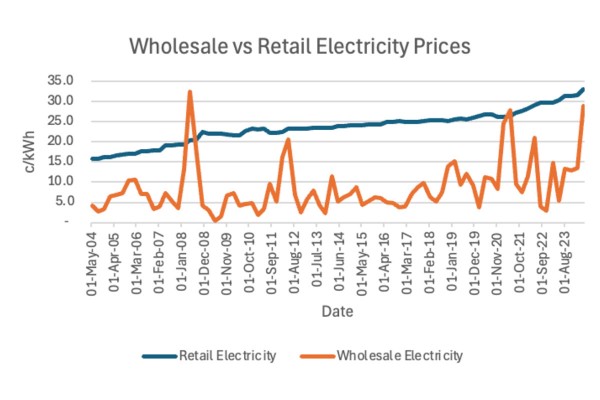If you’ve been having a nosey at the news (outside Critic, how dare you) in the last few weeks, phrases like “energy crisis” or “tight supply conditions” have been chucked around. The main gist of the issue is that wholesale power prices have risen above retail prices. The bad news: certain power companies are not taking on new customers as a result. The good news: don’t expect a rapid increase in your bills anytime soon.
A quick crash course: New Zealand power companies buy electricity (at wholesale prices), who then ‘sell’ it to the people (at retail prices). So in other news, it's been costing more to buy power than to sell it to us – and this could mean bad news for already-stretched StudyLink budgets (and those of you who sneakily chuck your heat pump on outside of free hours).
Aotearoa sources the majority of its energy from hydroelectric schemes. It's renewable (a big win for the planet), but also means it is at the mercy of Mother Nature. This winter has been quite dry (could’ve fooled me) causing water levels at dams across the country to drop.
And with logic even your breatha mates who failed BSNS113 follow, less supply and a high demand (i.e. your flat having the dryer and five heaters on at once) drives up prices of power. Start setting aside some booze money, ‘cos the increase in wholesale prices could be rocking up in a few weeks time. With selling electricity to the average consumer becoming less profitable, companies like Electric Kiwi have stopped taking on new customers to minimise losses.
Critic yarned with Fraser, a second-year Geography student, who is concerned about the state of the power market right now. He said, “Everything else, such as groceries and rent, is getting more expensive, so it's gotta be a choice between cooking and heating at this point when it should be a human right to do both without worrying.” But Fraser’s concern about power prices has proven controversial, with his proposal to ban ‘everything showers’ for his 2025 flatmates becoming a divisive topic. Anything to save a buck, hey?
On a more serious note, Fraser suggested a few solutions, including, “Building more sustainable electricity options, such as battery dams to store water when we have excess in spring” as well as investing more in “taking advantage of our windy islands.” Maybe Geo students do more than just frolic outdoors on their field trips?
Critic reached out to Electric Kiwi, for an inside scoop of what everything in the market means for us students. Unfortunately, they did not respond in time for print. Pushing on, Critic yarned with the next best thing: Joel, an Energy Management major. Overall, he said that there is good news for power prices in the future: “As individuals and households, we all have the power to reduce the cost of our power bills over winter.
Joel shared his personal ins and outs for energy management. Ins included using the heat pump (“pumps out around 3x what you put in”) and electric blankets (“use 90%+ less electricity than a heater”). Listed in his outs were resistance/oil heaters (“inefficient and slow”) and hot washing machine cycles (3x the price of a cold wash”).
“New Zealand is ripe with opportunities to strengthen and grow our electricity market. On the supply side, we can, and will, continue to grow our low-carbon electricity sector with expansions to wind, solar, and geothermal generation,” said Joel. “On the demand side, batteries, EV's, and other storage technologies will present change, challenge, and chance for market players.”
Embracing his nerdier side (probably a prerequisite to be an Energy Management major), he gave Critic the nitty-gritty of what’s been happening to the power market. “While it might seem logical that a rise in wholesale power prices would immediately affect retail prices (the prices reflected in students' electricity bills), this isn’t necessarily the case.”
Joel reminds us that if we use more power, we’re gonna pay more. You can’t fault his logic – and he had receipts. “A study of electricity usage by Otago UniFlat’s reveals a strong correlation between temperature and power consumption. Notably, the coldest day of the year also saw the highest electricity usage by UniFlat residents. Overall, electricity consumption surged by 66% from autumn to winter.” In case we needed another reminder they get unlimited power.
He even made a cheeky graph comparing wholesale prices to retail prices, showing that the prices students pay are a lot less volatile than the wholesale prices:
“Over the past two decades, the standard deviation for retail prices was 3.99 c/kWh, compared to 6.24 c/kWh for wholesale prices, highlighting that wholesale electricity prices fluctuate more than retail prices. All that is to say that the price/kWh of electricity will likely not change wildly in the next few weeks.”
If all those words scared you, in short: no wild price increases should be coming soon. And don’t let your flatmates freeze to death. It’s not cool.



